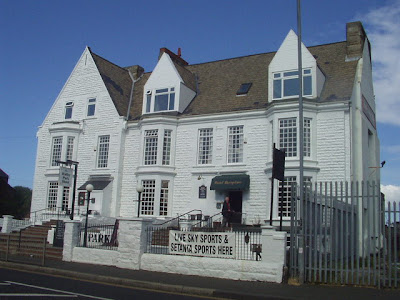
I had to sit down on the bench across from it to take the picture properly - honest!

I read about these huts a little while back, but was still amazed to see them. Beach huts are apparently quite common around the south of Britain from what I've read in women's magazines. I gather they were very popular back in the 'old' days -- 40s and 50s maybe?, I dunno, anyhow, like so many other things they went out of fashion and now they are back in. They looked quite intriguing as I trotted past, all fully occupied, too.

Beyond Blyth beach is the Port of Blyth. I actually accompanied a former environmental health officer on a ship visit years ago. I mainly remember that it was a Japanese built ship with lovely wood, but very low ceilings and the captain was a very tall Norwegian.

I've always admired the Ridley Park Hotel as a lovely building, but I don't have any use for 'live Sky sports' at any time.

Ridley Park is a good sized green area and it is always beautifully kept. On this day it wasn't in best bloom, but there were lots of signs that it soon would be.
My turn around point was a little brick building at the end of the road, the office of a former colleague, a really nice man. I believe he too is now retired and this building has a different purpose now. It used to be the office of the port health officer whose job it was to make sure no dogs came ashore (keeping Britain rabies-free), none of the crew had the plague, etc. I only visited the office a couple of times, but I always thought it was perfect the way John had a big room and a big desk, just beside the sea and the park.

Best of all, his office had a bed and bowl for his dog, who came to work with him every day. I can't think of a better work environment and I always envied him being able to have his dog at the office!
















































